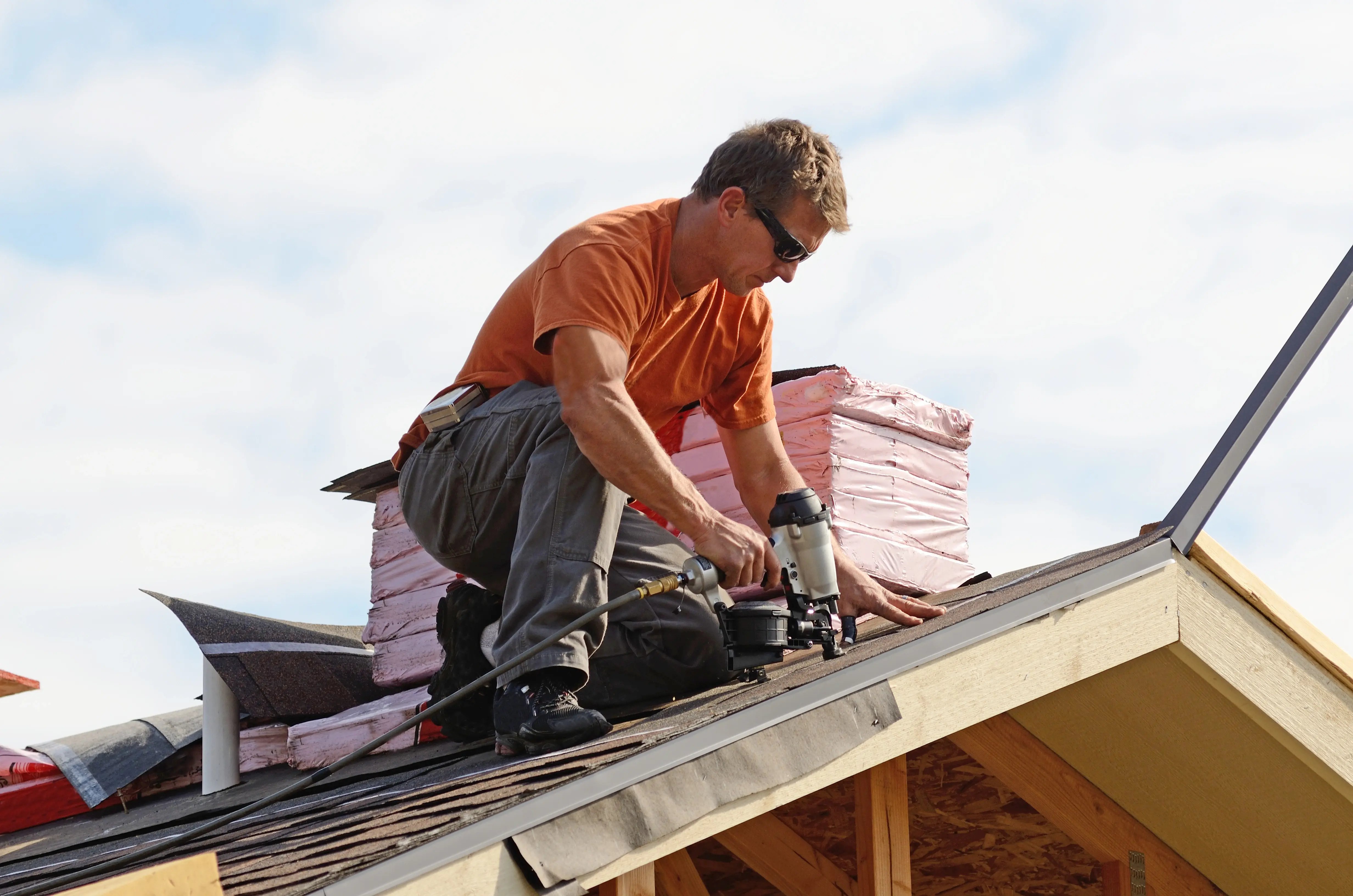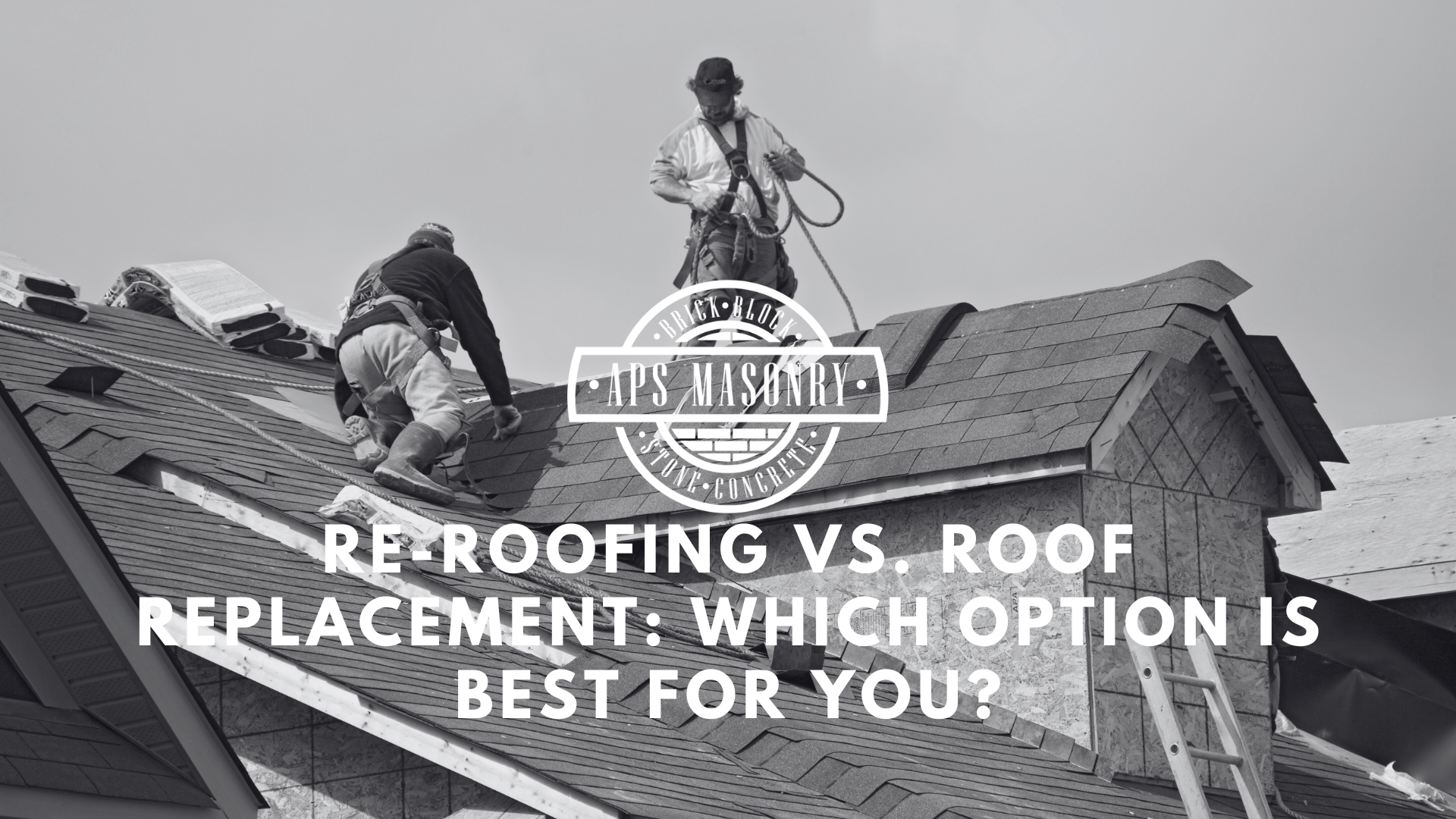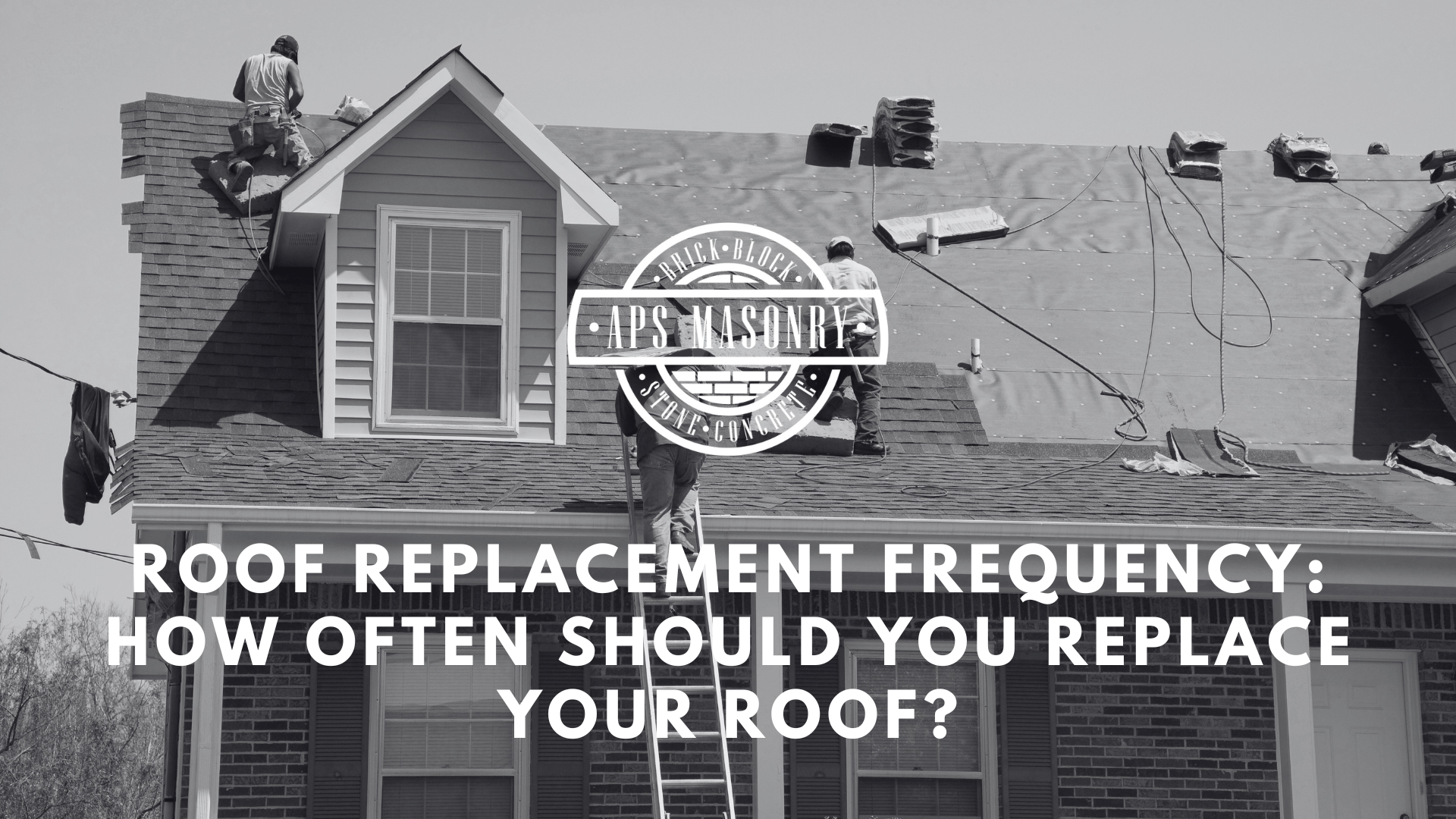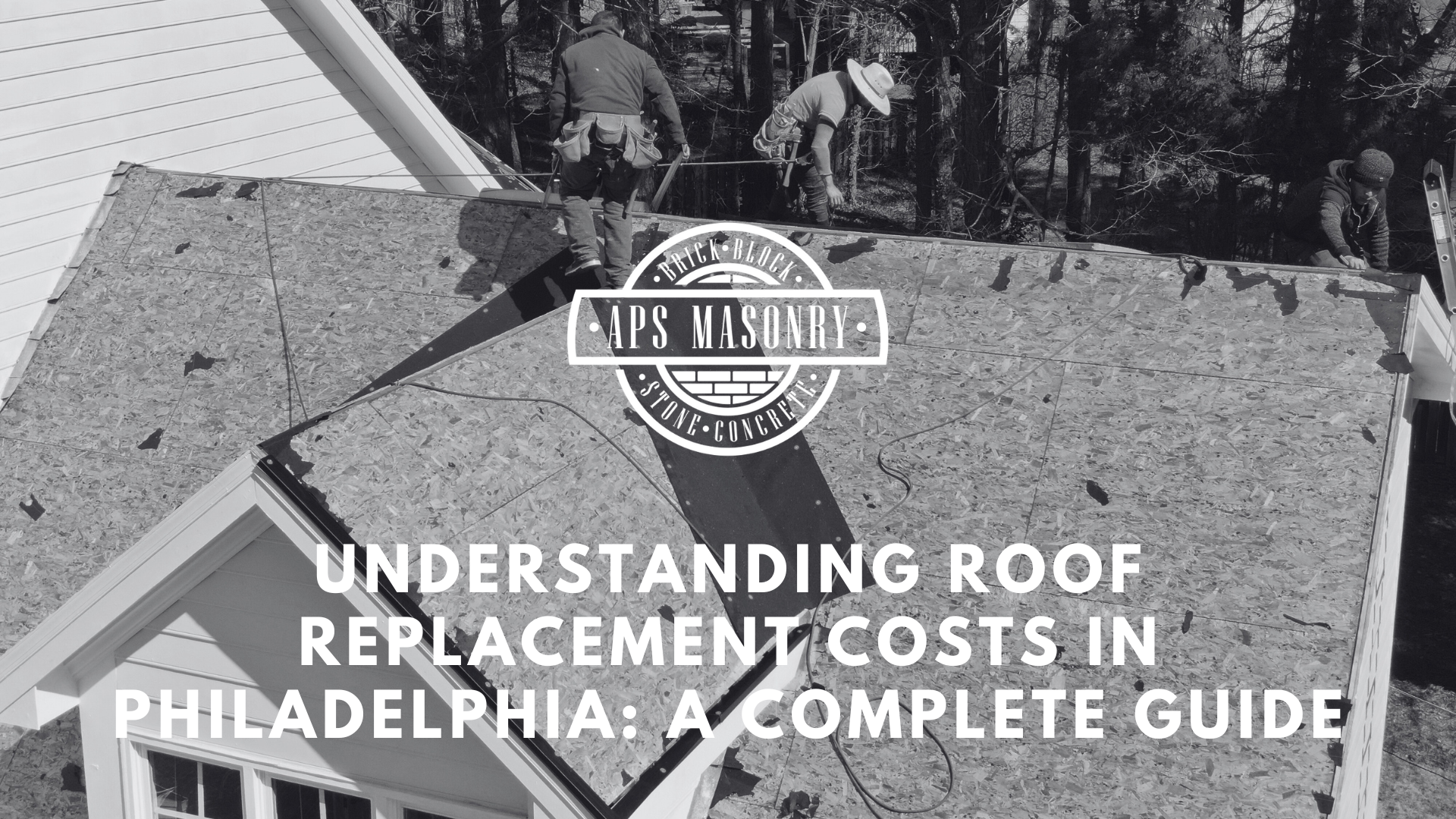Maintaining a strong roof is highly important for the safety and longevity of any home. A well-maintained roof protects against weather elements, enhances energy efficiency, and boosts property value.
Understanding the difference between re-roofing and roof replacement is crucial for homeowners facing roofing issues. Each option has distinct processes, benefits, and costs that can significantly impact your home’s protection and budget.
In this blog, we will explore the key differences, helping you decide on your roofing needs. APS Masonry & Contracting brings expertise to guide you through this essential choice.
Understanding Re-Roofing
Re-roofing involves placing a new layer of shingles over an existing layer. This process does not involve removing the old roof but adds a protective layer on top of the existing one.
Overview of the Re-Roofing Process
- Inspection: A thorough inspection of the existing roof to assess its condition.
- Preparation: Cleaning the old roof to remove debris and ensure a smooth surface.
- Installation: Laying new shingles over the existing ones, ensuring proper alignment and securing them in place.
Benefits of Re-Roofing
Cost-Effectiveness: Re-roofing is generally cheaper than a full roof replacement because it requires less labor and fewer materials.
Time-Saving: The process is quicker since it involves less demolition and disposal work, leading to shorter project times and less disruption.
Limitations of Re-Roofing
- Not Suitable for All Roofs: Re-roofing is only feasible if the roof has a single layer of shingles in good condition. Local building codes often restrict the number of layers a roof can have.
- May Not Address Underlying Issues: Re-roofing covers the existing shingles, which means it may not address problems like leaks, rot, or structural damage beneath the surface. These issues can persist and worsen over time if not properly addressed.
Understanding Roof Replacement
Definition of Roof Replacement
Roof replacement involves removing the existing roof down to the deck and installing a new roof. This process addresses all underlying issues and provides a fresh, durable roofing system.
Overview of the Roof Replacement Process
- Inspection: Detailed assessment of the current roof’s condition.
- Removal: Stripping away old shingles and underlayment, exposing the roof deck.
- Repair: Fixing any damage to the roof deck, such as rot or structural issues.
- Installation: Applying new underlayment, followed by the installation of new shingles or other roofing materials.
- Final Inspection: Ensuring the new roof meets all quality and safety standards.
Benefits of Roof Replacement
Comprehensive Solution: Roof replacement addresses all issues, including damaged decking, leaks, and insulation problems. This ensures a complete and effective roofing system.
Long-Term Durability: A new roof provides enhanced protection and longevity, often backed by extensive warranties. This investment can significantly extend the life of your roof.

Limitations of Roof Replacement
Higher Cost: Roof replacement is more expensive due to the labor-intensive process and the need for new materials. This can be a significant investment for homeowners.
Longer Project Time: The process takes longer than re-roofing because it involves removing the old roof, repairing the deck, and installing a new roof. This can cause more disruption to your daily life during the project.
Factors to Consider When Choosing Roof Replacement vs. Re-Roofing
Age of the Existing Roof
- Older Roofs: Roofs nearing the end of their lifespan (typically 20-25 years for asphalt shingles) often require replacement to ensure long-term protection.
- Newer Roofs: If your roof is relatively new but has minor issues, re-roofing might be a more practical and cost-effective option.
Extent of Damage
- Minor Damage: Small, isolated problems like a few missing shingles or minor leaks can often be addressed through re-roofing.
- Major Damage: Extensive damage, such as widespread leaks, significant rot, or structural issues, necessitates a full roof replacement to ensure the integrity of the roof and safety of the home.
Budget Constraints
- Limited Budget: Re-roofing is generally less expensive and may be suitable for those needing a quick, short-term solution.
- Investment Capability: If budget allows, investing in a roof replacement can provide better long-term value, with fewer maintenance costs and longer durability.
Future Plans for the Property
- Short-Term Ownership: If you plan to sell the property soon, re-roofing might improve curb appeal and marketability without a large investment.
- Long-Term Ownership: For those intending to stay in their home for many years, a roof replacement can offer peace of mind and long-lasting protection, making it a worthwhile investment.
Re-Roofing vs. Roof Replacement: Cost Comparison
Re-Roofing Costs
- Average Cost: Re-roofing generally costs between $5,000 and $10,000 for a typical 2,000 square foot home.
- Cost per Square Foot: Approximately $2.50 to $5.00 per square foot.
Roof Replacement Costs
- Average Cost: Roof replacement typically ranges from $10,000 to $20,000 for a similar 2,000 square foot home.
- Cost per Square Foot: Around $5.00 to $10.00 per square foot.
Factors That Affect the Cost
- Materials:
- Re-Roofing: Primarily involves the cost of new shingles, which varies depending on the type (asphalt, metal, etc.). Asphalt shingles cost around $100 to $200 per square.
- Roof Replacement: Includes the cost of shingles and additional materials like underlayment, decking repairs, and new flashing. Asphalt shingles cost around $100 to $200 per square, while premium materials like metal or slate can cost significantly more.
- Labor:
- Re-Roofing: Labor costs for re-roofing are lower since the process is less labor-intensive. Expect to pay around $2,000 to $4,000 for labor on a 2,000 square foot roof.
- Roof Replacement: Labor costs are higher due to the complexity and duration of the job, ranging from $5,000 to $10,000 for a 2,000 square foot roof.
- Roof Size:
- Smaller Roofs: Smaller roofs will naturally cost less, both in materials and labor.
- Larger Roofs: Larger roofs increase the overall cost proportionally, with more materials needed and additional labor hours.
Real Data for Cost Estimates
According to HomeAdvisor and the National Roofing Contractors Association (NRCA), the average cost for re-roofing (overlaying shingles) is approximately $7,500, while a complete roof replacement averages around $15,000. These figures align with the industry standards and provide a realistic expectation for homeowners considering these options.
Reach Out for a Free Estimate
Material Choices and Their Impact
Common Materials Used in Re-Roofing
- Asphalt Shingles:
- Cost: Approximately $100 to $200 per square (100 square feet).
- Longevity: 15-30 years.
- Advantages: Cost-effective, easy to install, widely available.
- Metal Roofing:
- Cost: Around $300 to $700 per square.
- Longevity: 40-70 years.
- Advantages: Durable, energy-efficient, low maintenance.
Common Materials Used in Roof Replacement
- Asphalt Shingles:
- Cost: $100 to $200 per square.
- Longevity: 15-30 years.
- Advantages: Cost-effective, versatile, easy to install.
- Metal Roofing:
- Cost: $300 to $700 per square.
- Longevity: 40-70 years.
- Advantages: Long-lasting, energy-efficient, fire-resistant.
- Tile Roofing (Clay or Concrete):
- Cost: $600 to $1,200 per square.
- Longevity: 50-100 years.
- Advantages: Extremely durable, aesthetic appeal, resistant to harsh weather conditions.
- Slate Roofing:
- Cost: $1,000 to $3,000 per square.
- Longevity: 75-200 years.
- Advantages: Highly durable, natural appearance, low maintenance.
How Material Choice Impacts Longevity and Cost
- Cost Implications:
- Initial Investment: Materials like asphalt shingles and metal roofing are more affordable initially. However, premium materials like tile and slate have higher upfront costs.
- Long-Term Savings: While initial costs for tile and slate are high, their longevity can lead to savings over time due to fewer replacements.
- Longevity and Maintenance:
- Short-Term Solutions: Asphalt shingles offer a more budget-friendly option but may require replacement sooner.
- Long-Term Solutions: Metal, tile, and slate roofing provide longer-lasting protection, reducing the need for frequent replacements and maintenance.
- Energy Efficiency:
- Reflective Materials: Metal roofing is highly reflective, which can lower cooling costs.
- Insulating Materials: Tile and slate offer natural insulating properties, contributing to better energy efficiency in extreme climates.
Real Data for Material Costs and Longevity
According to the National Association of Home Builders (NAHB), the average lifespan of asphalt shingles ranges from 15-30 years, metal roofing lasts 40-70 years, tile roofing can last 50-100 years, and slate roofs can endure for 75-200 years. These longevity estimates reflect industry standards and provide a reliable basis for material choice decisions.
When choosing between re-roofing and roof replacement, considering the material's cost, durability, and energy efficiency can help homeowners make informed decisions that align with their budget and long-term home maintenance goals.
Our Expertise
APS Masonry & Contracting brings extensive experience in both re-roofing and roof replacement services. With years of industry expertise, our skilled team has successfully completed numerous projects, ensuring that every roof we work on provides lasting protection and enhances the home’s value. Whether it's a simple re-roofing job or a complete roof replacement, we have the knowledge and skills to deliver outstanding results.
Quality Workmanship and Customer Satisfaction
At APS Masonry & Contracting, we pride ourselves on our commitment to quality workmanship. Our team uses only the best materials and adheres to industry best practices to ensure every project meets the highest standards. We understand that your home is your most significant investment, and we treat every project with the utmost care and attention to detail.
Customer satisfaction is our top priority. We work closely with homeowners to understand their needs and provide tailored solutions that fit their budgets and preferences. Our transparent communication, reliable timelines, and dedication to excellence have earned us a reputation for outstanding service and happy clients.
Ready to protect your home with expert roofing services? Contact APS Masonry & Contracting today for a free consultation. Our experienced team will assess your roofing needs and provide a detailed, no-obligation estimate. Trust us to deliver the best solutions for your home.
Work With Us Today
 Alec Serowatka
:
Aug 8, 2024 11:52:00 AM
Alec Serowatka
:
Aug 8, 2024 11:52:00 AM




